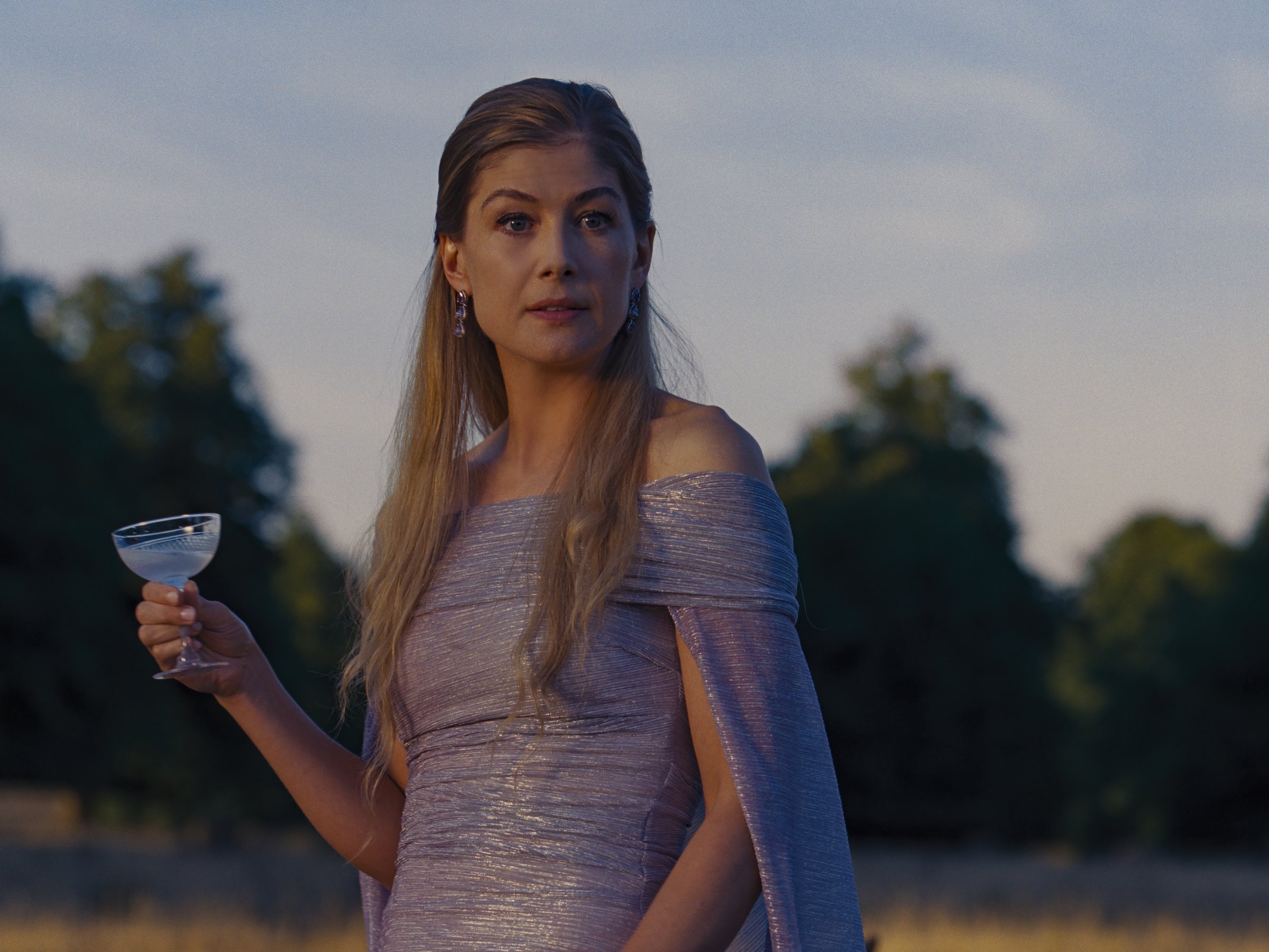In general, there’s nothing wrong with movies that remind us of other movies. This is how genres rejuvenate themselves across the decades, building on themes and moods that have come before. But a movie’s tone, maybe even more than its plot, is everything, and that’s where writer-director Emerald Fennell’s Saltburn fails. Saltburn—which, seemingly intentionally, tears more than a few deckled-edge pages from Brideshead Revisited and The Talented Mr. Ripley—isn’t just about class envy and repressed desire. There’s something arch and self-satisfied about it as a work; it’s a satire served up with a sneer rather than a conspiratorial wink, as if Fennell knows stuff you don’t and isn’t interested in allowing you inside her club. Saltburn begins with a mildly intriguing premise. But Fennell can’t seem to distinguish dark, transgressive pleasures from outright unpleasantness, and the whole enterprise ends with an acrid aftertaste.
The setting is Oxford University circa the early 2000s. Barry Koeghan, who gave such a crushing performance as the lovesick Dominic in The Banshees of Inisherin, is Oliver Quick, a freshman who shows up with the wrong clothes, the wrong luggage, the wrong everything. He desperately wants to fit in, but the kids from the fancier families look right through him. He gazes from afar at one shimmering god in particular: Felix Catton (played by Jacob Elordi, recently seen as Elvis Presley in Sofia Coppola's Priscilla) is one of those young men who moves through the world like a cool breeze. Everyone likes him, especially the girls. He’s at ease with everyone and jealous of no one, because he’s never had to fight for anything. And unlike Oliver, he comes from a hugely rich, titled family. Oliver yearns to be Felix’s friend, or maybe more, but he’s left stammering on the sidelines, terrified at even attempting to make contact.
Read more: The 100 Best Movies of the Past 10 Decades

Then a miracle happens: Oliver, biking home from class one day, spots Felix sitting near the road, his own bike felled by a flat tire. Oliver sees his chance: gallantly, he loans his bicycle to Felix, who gratefully accepts. After this, Felix takes a surprising interest in Oliver, inviting him into his circle of friends, even though these are generally disdainful kids who point at Oliver behind his back, mocking him for his OxFam wardrobe. Worst of all is Farleigh Start (Archie Madekwe), Felix’s cousin, who’s dependent on the charity of Felix’s family and sees Oliver as a rival. Still, Oliver barrels through, courting Felix’s friendship, if not his romantic affection. And Felix takes pity on him: Oliver has explained that his parents are drug addicts, so hopelessly messed up he’s had to cut ties with them. At the end of the school term, Oliver has nowhere to go for the summer, and Felix makes a cheerful suggestion: Why doesn’t Oliver join him at his family’s estate, Saltburn? It’ll be a lark. Oliver doesn’t want to be pitied, but reluctantly, he accepts.
The fun of Saltburn, or at least whatever fun it has to offer, lies in not knowing who the villains are. Farleigh, also spending the summer at Saltburn, is the most obvious antagonist; he wields his haughtiness like a clanking sword. There’s a butler, Duncan (Paul Rhys), who seems to have it out for Oliver from the beginning, sneering at him with the kind of snobbery that only a dedicated servant of the rich can summon. Felix has an emotionally fragile sister, Venetia (Alison Oliver), whose motives are hard to discern at first. And Felix himself is, for much of the movie, blankly enigmatic. He’s kind enough to Oliver. But what does he want, really? Upon Oliver’s arrival, he leads his less-fortunate friend on a tour of the family house, pointing out its many artifacts and wonders, including room after room filled with paintings of “dead rellies” and a bed that reportedly “still has Henry VIII’s spunk on it.” It’s all rather jolly, until Felix informs his friend that the family insists on dressing for dinner—and offers one of his own discarded dinner jackets, knowing Oliver won’t have brought anything suitable.
What’s going on here? Who’s zoomin’ who? As Oliver settles in at Saltburn, he becomes emboldened, happy to play at being something he’s not. (It’s also revealed that he’s exceptionally well-endowed, a fact we eventually get to confirm with our own eyes.) But the film becomes more sour with every twist; it wears its grim determination to shock like a family crest. There’s grandness in its setting: the house, with all its brooding wood molding and dusty tapestries, is clearly a place of secrets. (These portions of the film were shot at Drayton House in Northamptonshire, a private residence.) But like Fennell’s debut film, Promising Young Woman—which netted her the Oscar for Best Original Screenplay—Saltburn is more clever than it is smart. Promising Young Woman presented complicated ideas about consent only to roll them into one big, obvious teachable moment. Saltburn riffs on the psychology of sociopaths with little wit or subtlety. Instead of seducing us with wicked treachery, it draws big neon signs around its vision of the dark side of human nature, just to make sure we get the point.

But there’s at least a cream-dollop of pleasure to be had in watching some of Saltburn’s performances. Carey Mulligan pops in as a kooky family friend, with fuzzy, rock-star-girlfriend hair and a penchant for rhinestone Union Jack accessories, who eyes Oliver as if he were a delectable prize. Richard E. Grant is mildly delightful as Sir James Catton, Felix’s dotty, seemingly benign father. But the movie really belongs to Rosamund Pike, as Felix’s mother, the posh girl turned mistress of the manor Elsbeth, Lady Catton. Elsbeth swirls through the house, and the movie, in an assortment of elegant-eccentric caftans and evening dresses, her eyebrows perpetually arched in either faux or sincere superiority. Elsbeth gets by on a mix of shrewd wisdom and glorious, feathery upper-crust cluelessness. It’s little wonder Oliver is enchanted by her. But the movie around her is too smug by half. Elsbeth deserves her own picture, maybe one exploring the story of how she just may have, as she alludes in Saltburn, inspired Pulp to write "Common People." Now that would be a movie.
More Must-Reads from TIME
- Donald Trump Is TIME's 2024 Person of the Year
- Why We Chose Trump as Person of the Year
- Is Intermittent Fasting Good or Bad for You?
- The 100 Must-Read Books of 2024
- The 20 Best Christmas TV Episodes
- Column: If Optimism Feels Ridiculous Now, Try Hope
- The Future of Climate Action Is Trade Policy
- Merle Bombardieri Is Helping People Make the Baby Decision
Contact us at letters@time.com